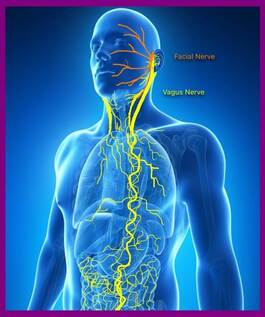The vagus nerve holds a metaphoric map to the the body, able to influence almost every major internal organ, and is the captain of the parasympathetic state. When this nerve is activated, it responds by signaling the connected organs and systems to also relax, resulting in the heart rate slowing, respiratory rate slowing and the breath deepening, muscle contractions releasing (remember, this is where that change and repair/build function happens), decrease in inflammation, and rerouting of resources back to digestion and the immune system. It’s also been shown to have impact on “turning off” asthma attacks, epileptic seizures, and migraine or cluster headaches. Psychologically, it’s been linked to the release of stress, anxiety, nervousness, and neural calm which can aid in expression and social interaction. When activated, it can induce sensations of safety, a much needed state to build an internal infrastructure for growth on all levels.
There are various ways to activate the vagus nerve, and just like other systems in the body, the vagus nerve can be “exercised” and toned. Here are some helpful techniques to try:
- Deep, slow breathing where the inhale expands deep in the belly and the exhale brings the navel towards the spine.
- Humming or chanting, the vibration from which stimulates the vagus nerve.
- Laughter!
- Sleeping on the right side of the body stimulates the vagus nerve to release calming hormones.
- Cold showers or splashing cold water on your face.
- Massaging the neck, shoulders and ears.
Activating and toning the vagus nerve can help rebalance the body’s systems, regulate rest periods, and shorten the amount of time the body is in the sympathetic nervous state (that’s the fight or flight one where resources are directed away from all non-essential functions). We can't engage something we've never learned to relax, and if we're always "on", then we can't properly learn how to turn it "off" and relax. Relaxation and rest is just as much an exercise and fitness practice as is building and maintaining muscle. Our society is obsessed with productivity and the do-do-do attitude, and I for one am guilty of complying. Like Tami, I enjoy contributing to the world I'm a part of and doing my small daily part to make it a happy place to be. A deeper part of this is that relaxation and just "being" without tasking the mind with things is hard work, but necessary in our well-being.
Best,
Katherine
References
https://www.psychologytoday.com/us/basics/vagus-nerve
https://suddenrushguarana.com/blogs/news/the-vagus-nerve-is-key-to-well-being


 RSS Feed
RSS Feed
